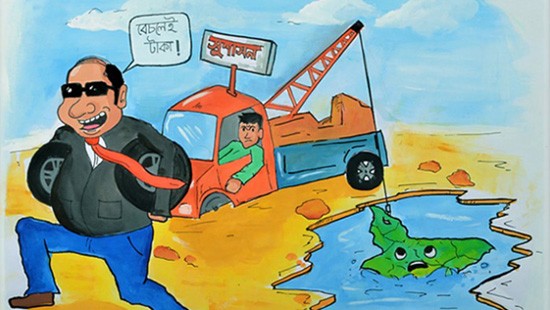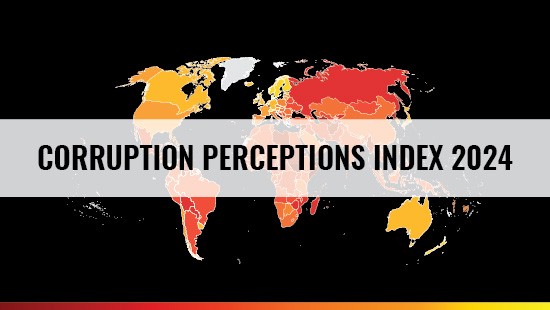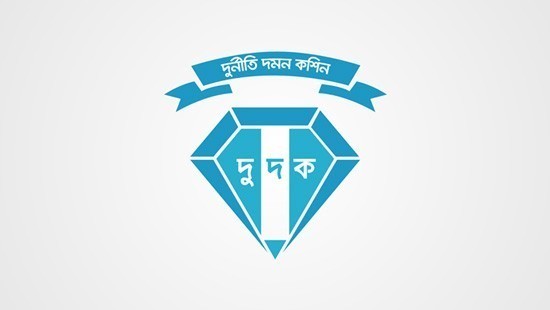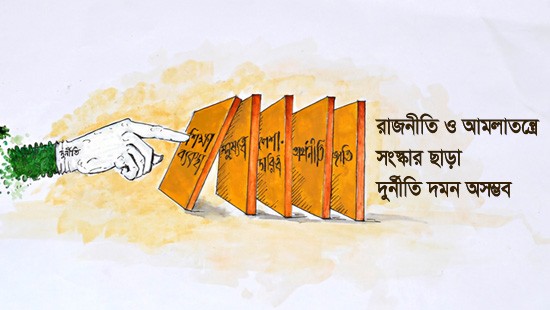Published: 17 September 2015
The way development is taking place in Bangladesh goes against the spirit of democracy, against the aspiration of the people in Bangladesh and against the existence of the country as an independent nation. The development model will not be acceptable to the Bangladeshi people as their mindset is oriented towards democracy culturally, Iftekharuzzaman, executive director of the Transparency International, Bangladesh, tells Khadimul Islam in an interview with New Age
New Age: The ruling Awami League and its partners claim these days that economic development is more important than political democracy. Do you agree?
Iftekharuzzaman: I would say it is very difficult to agree with this. You know that there is no clarity of the position taken by some of the leaders of the government. As far as my understanding is concerned, it is not the government’s official position. The statement that you refer to has been articulated by a section of leaders of the government. But this cannot reflect the official position of the government. It is also not clear why such claims are being propagated. It is difficult to answer why such theories are being propagated.
If you ask me to comment on the choice between democracy and development, I would say that there is nothing to choose from between the two as development and democracy have to move hand in hand. One is indispensable for the other. Amartya Sen in his book Development as Freedom clearly shows why and how freedom and democracy are indispensable for any development. It has already been proved academically that without ensuring democracy and freedom of the people, full development is not possible. If you look at the matter in a socioeconomic context, you have to take people as an agent for development.
Goals for development would not be achieved without the involvement of people as people’s potential as an agent for development can flourish in a democratic context.
This is not a valid proposition and I cannot agree to the proposition as there is no option for choice between development and democracy. The proposition of ‘development first and then democracy’ is not tenable because it goes against the spirit of the independence of Bangladesh. Democracy, democratic values, people’s basic and fundamental rights and equality of people irrespective of colour and race is part of our spirit of the independence war and thus the identity of our nation.
New Age: Why do you think that the Awami League, which has fought for political democracy in the past, has now resolved for development without democracy?
Iftekharuzzaman: As I understand, the January 5, 2014 general elections were debatable; the debate still exists with regard to the credibility of the elections, which were not in any manner inclusive. The degree and extent, to which the fairness continues to be debated, has given rise to a lack of confidence in some people about a section of those in the government. This has made the stance of the government as a democratic and accountable one questionable. That is why there are demands from opposition parties and a section of people from society for fresh elections. Probably this has led a section of the people in the government to put development before democracy. Perhaps, it would be better for them to answer the question from their official position.
New Age: How do you evaluate the ‘development’ taking place under the present political regime? Are the people at large getting significantly benefited from the development model, if there is any, that the incumbents are following?
Iftekharuzzaman: The government has taken up some big infrastructural projects on a priority basis so that these can be more visible. There are reasons behind taking up these big projects because you need big infrastructural projects for long-term development. But the goals of such development efforts can only be achieved when such action will include people’s participation and the whole process will have accountability. To accomplish such big projects, there is a process of handing out work order through inviting tenders. But the process must be transparent. There should be an effective parliament which will ensure the accountability of the government on behalf of the people of the country with regard to ensuring this transparency. So, without an effective parliament and parliamentary standing committees, transparent and accountable governance cannot be ensured.
It may be too early to observe whether people at large will get significantly benefited from the development model. But the question may be raised if accountability can be ensured without any institutional, administrative and legal policy structure and without people’s participation in the process of development. And, thus, doubts may also occur whether benefits of the development can reach people. This question can always be raised. It is, however, too early to say that what is happening now without people’s participation and transparency will not provide dividends in the future.
But I am definitely doubtful about any development process without having any governing system and institutional policy infrastructure for ensuring the accountability of the government.
A section of the government is referring to some of the East Asian countries like Singapore, Malaysia and so on, which have definitely done very well recently in terms of ensuring proper development without ensuring fully-fledged democracy in the true sense of the term. But their development efforts were initiated in a different context.
But I am not sure if the same model should be applicable to the case of Bangladesh as well. I think those who are the proponents of such a theory of ‘development first and democracy later’ should have a closer look at it. There is a contextual difference between Bangladesh and those countries. Those counties may have leaderships that can fall in the category of benevolent dictatorship. But I am not sure if we have a benevolent leadership or dictatorship in Bangladesh. I think this is a big question. Bangladesh cannot afford to have such sort of dictatorship in the country. I do not think any of the leaders in the country will like to be addressed as a benevolent dictator. Secondly, of course, from cultural point of view, those East Asian countries that have been referred to were not much oriented towards democracy historically for development. Bangladesh is different from them. Bangladesh is a country that has fought for democracy; it is a country where people are always ready to fight for democracy; they take to streets to protest against any kind of violation of human rights. But you will not find these things in those countries. So, the way development is taking place in Bangladesh goes against the spirit of democracy, against the aspiration of the people in Bangladesh and against the existence of the country as an independent nation. The development model will not be acceptable to the Bangladeshis as their mindset is oriented towards democracy culturally.
New Age: Is a meaningful economic development possible without people’s democracy?
Iftekharuzzaman: No, I personally do not think that it is possible without a democratically-governed country. The multi-dimensional objectives of development cannot be achieved unless the system or the process for development is participatory. It has to be inclusive; it has to include all sections of society; it needs to ensure the participation of the people at large as people are the agents of development. In order to transform the people of a country into agents of development, it has to have a democratic structure in which people’s democratic rights would be ensured. Without ensuring people’s democratic rights, people-oriented development cannot be achieved. And in that case the trickle-down effect of any development would not result in greater prosperity for society as a whole. But within a participatory democratic process, that is possible.
New Age: How do you think Bangladesh can combine democracy and development?
Iftekharuzzaman: Democracy and development are two sides of the same coin. In order to ensure effective development, effective democracy is needed. To make democracy effective, there must be a democratic process buttressed by people’s representatives. To make that happen, people’s participation is a must.







